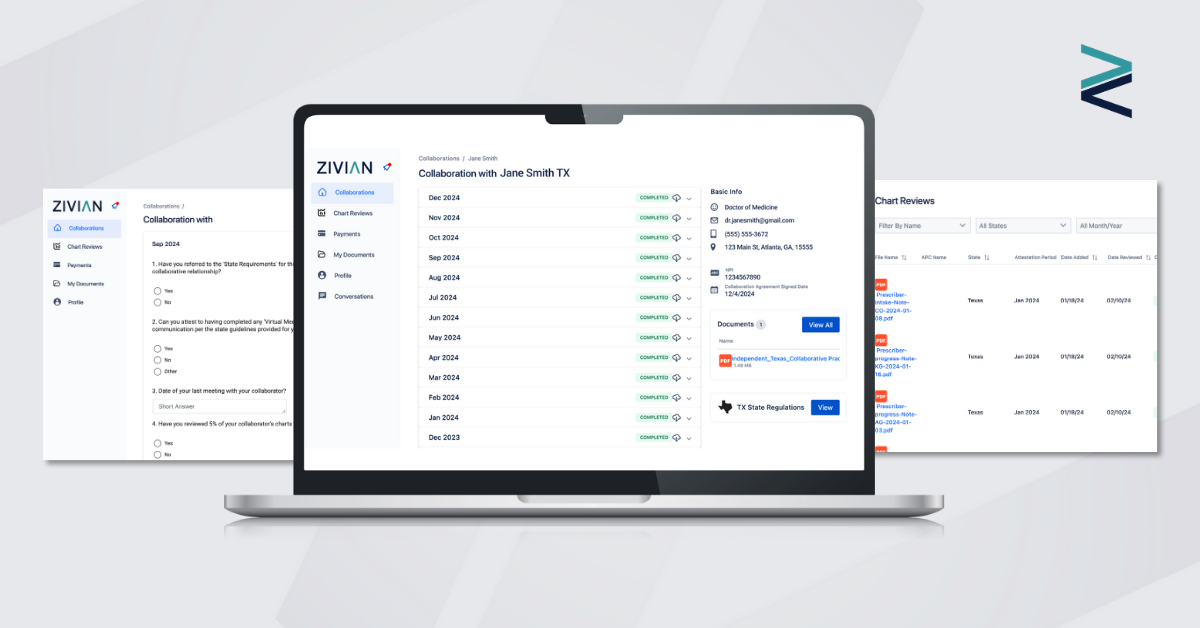
At Zivian Health, we believe that collaboration between nurse practitioners (NPs) and physicians is crucial for improving the delivery of high-quality patient care. These partnerships can improve patient outcomes and expand access, especially in underserved areas.
However, navigating the complexities of healthcare compliance in NP-physician collaborations can present challenges. From scope of practice concerns to billing discrepancies, maintaining awareness of potential compliance issues is an important part of running a legally sound practice.
In this post, we explore common compliance challenges and how to address them effectively, with a special focus on how Zivian Health helps solve these problems before they arise.
Common Compliance Issues
1. Scope of Practice Violations
Every state has regulations defining what nurse practitioners can and cannot do independently, as well as tasks requiring physician oversight. These laws differ widely and are subject to change, making the regulatory landscape difficult to navigate.
If an NP performs tasks without required physician oversight or exceeds their legal scope, it can result in legal penalties, audits, or even loss of licensure.
Solution:
-
Regularly review state-specific scope of practice laws.
-
Develop clear collaborative agreements that reflect current state regulations and outline roles and responsibilities.
-
Stay informed on regulatory changes through compliance software, professional organizations and legal resources.
2. Incomplete or Missing Documentation
Keeping clear and accurate documentation of collaboration activity is critical for compliance. This includes collaborative agreements, chart reviews, meeting logs, treatment plans, and other evidence of collaboration.
Missing or incomplete documentation can lead to audit failures and accusations of non-compliance.
Solution
-
Create and maintain documentation practices across your practice and within your collaborative relationship.
-
Use digital tools or compliance software to standardize and automate documentation processes so that all required records are up to date and accessible.
-
Train staff regularly on compliance documentation requirements.
3. Failure to Conduct Chart Reviews
Many states require collaborating physicians to review a percentage of patient charts. Neglecting this requirement or failing to document reviews can result in compliance violations during audits.
Solution
-
Establish a clear chart review process. Determine how many charts must be reviewed based on state regulations, set review criteria, and standardize your review protocol.
-
Create schedule to conduct regular chart reviews.
-
Use digital solutions or collaboration platforms that provide clear guidelines and reminders for conducting chart reviews.
4. Billing and Reimbursement Errors
Missteps in billing for services provided by NPs, such as failing to meet “incident-to” billing requirements or incorrectly identifying the provider of record, can lead to audits, denied claims, or allegations of fraud.
In addition, incorrect credentialing can lead to billing under the wrong provider, resulting in denied claims or reduced reimbursements.
-
Develop an understanding of billing regulations and policies for “incident-to” billing, direct billing, and state-specific guidelines.
-
Schedule regular internal billing audits to identify errors or inefficiencies
-
Make sure that both parties involved in the collaborative relationship have been properly credentialed and enrolled with essential payers.
5. Lack of Supervision and Oversight
State regulations often dictate the level of supervision or collaboration required for NPs. This can include direct supervision, collaborative oversight, or full autonomy. Misunderstanding these requirements can lead to major compliance violations.
Inadequate communication between NPs and their collaborating physicians can result in gaps in oversight, missed compliance requirements, or errors in patient care.
Solution:
-
Establish a clear supervisory plan with your collaborating physician.
-
Establish and stick to a schedule for regular collaboration meetings and case reviews.
-
Use secure, HIPAA-compliant communication tools.
-
Document all interactions to create a compliance trail.

How Zivian Health Solves Collaboration Compliance Issues
Managing compliance in NP-physician collaborations can feel overwhelming, especially when juggling patient care and administrative tasks. Plus, without a home base for your collaborative activities, staying organized is extremely difficult.
Zivian Health provides a seamless solution to address these challenges and streamline collaboration compliance.
1. Centralized Collaboration Management
Zivian Health offers a unified software solution for all of your collaboration activity, with a focus on compliance.
With the Zivian platform, you can automate compliance, chat and share charts with your collaborator, store essential documents, and create an exportable audit trail of your collaboration.
2. Automated Documentation and Audit Trails
Zivian Health’s platform simplifies documentation by creating an audit trail for all collaboration activities. Providers track their adherence to compliance requirements with monthly attestations, which are automatically documented in an exportable audit trail.
This ensures compliance with legal requirements and reduces administrative burden.
3. Real-Time Regulatory Updates
Keeping up with changing state regulations is challenging, but Zivian Health solves this problem by providing real-time updates on scope of practice laws and compliance requirements. In addition, the Zivian platform provides 24/7 access to a regulations database for your collaboration.
You’ll always know and have access to the rules governing NP-physician collaborations in your state.
4. Secure Communication Tools and Chart Reviews
Effective communication is vital in healthcare collaborations. Zivian Health offers HIPAA-compliant messaging and chart sharing, enabling seamless collaboration on patient cases and compliance documentation.
5. Proactive Compliance Alerts
Zivian Health sends proactive alerts that notify you to complete required compliance activities. These reminders help prevent missed obligations that could lead to penalties.
Conclusion
Navigating the compliance landscape for NP-physician collaborations doesn’t have to be a difficult task. By addressing common issues like scope of practice, documentation, billing, and supervision, you can create a compliant and successful partnership.
Leveraging tools like the Zivian platform can further simplify this process, providing centralized collaboration management, automated compliance tracking, and seamless communication.
Whether you’re a nurse practitioner seeking a collaborating physician or a physician interested in mentorship, Zivian Health offers a comprehensive solution to make sure your practice remains compliant while providing patient care.
Ready to solve your collaboration compliance challenges? Connect with us today and take the stress out of collaboration compliance.
Get started with Zivian Health today.
Related Posts